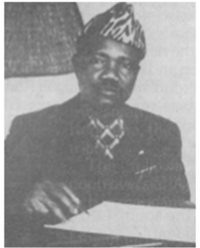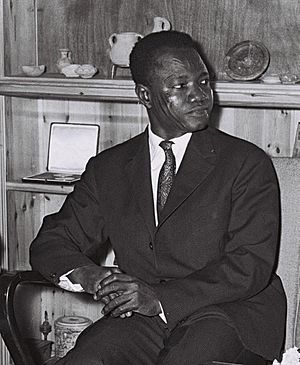François Tombalbaye facts for kids
Quick facts for kids
François Tombalbaye
|
|
|---|---|

Tombalbaye in the 1970s
|
|
| 1st President of Chad | |
| In office 11 August 1960 – 13 April 1975 |
|
| Prime Minister | None |
| Succeeded by | Noël Milarew Odingar (as interim head of state) |
| Colonial Prime Minister of Chad | |
| In office 26 March 1959 – 11 August 1960 |
|
| Preceded by | Ahmed Koulamallah (as President of Provisional Govt.) |
| Succeeded by | Hissène Habré (as PM of independent Chad) |
| Personal details | |
| Born |
François Tombalbaye
فرنسوا تومبالباي 15 June 1918 Moyen-Chari, French Chad |
| Died | 13 April 1975 (aged 56) N'Djamena, Chad |
| Cause of death | Murdered by soldiers in the 1975 Chadian coup d'état |
| Political party | PPT (1947-1973) MNRCS (1973-1975) |
| Profession | Teacher Trade unionist |
| Religion | Protestant |
| Signature | |
| Military service | |
| Allegiance | |
| Branch/service | Free French Forces |
| Battles/wars | World War II Chadian Civil War (1965–1979) |
François Tombalbaye (also known as N'Garta Tombalbaye) was the first President of Chad. He led the country from its independence in 1960 until 1975. His time as president was marked by strong leadership and political challenges. These challenges led to disagreements and a period of instability in Chad.
Tombalbaye was born in the southern part of Chad. He started his career as a teacher during the time when France ruled Chad. In 1946, he joined the Chadian Progressive Party (PPT). He became the leader of the PPT in 1959. When Chad became independent in 1960, he was chosen as its first president.
In 1962, Tombalbaye made the PPT the only legal political party. He led a government that favored people from his own region. He also tried to make Chad more "African" by changing some French influences. This program, however, made the divide between the Muslim north and the Christian and animist south worse.
In 1965, protests over taxes led to a civil war. His government was supported by France, while rebels in the north were supported by Libya. In 1973, he created a new party and changed his name to N'Garta Tombalbaye. He continued his efforts to make Chad more African. As the civil war continued, he lost support. In 1975, he was overthrown and killed by the Chadian military.
Contents
Early Life and Education
François Tombalbaye was born on June 15, 1918. His birthplace was the village of Bessada in southern French Chad. This area was near the city of Koumra. His father was a well-known trader. Tombalbaye belonged to the Sara people, a major ethnic group in southern Chad.
He went to a primary school run by Protestant missionaries in Sarh. Later, he attended secondary school in Brazzaville. As a young man, he trained to be a teacher in Brazzaville, which is the capital of the Republic of Congo. This was because there were not many schools in Chad at that time. During World War II, Tombalbaye fought for Free France. This group opposed the Nazi-backed Vichy regime.
Starting a Political Career
In 1946, Tombalbaye helped start a local branch of the Chadian Progressive Party (PPT) in Sarh. He encouraged people from his own group and other Sara speakers to join the party. In 1949, the French government took away his teaching job. This was a punishment for his involvement in political activities.
A year later, he became the director of the PPT newspaper, AEF Nouvelle. However, it closed down that same year due to French pressure. In 1952, he won a seat in the local colonial assembly. He was also elected to the French Equatorial Africa general council in 1957. There, he served as vice-president.
Tombalbaye took over from Gabriel Lisette as the head of the Chadian Progressive Party (PPT) in March 1959. He then led Chad's government during its colonial period. When Chad gained independence on August 11, 1960, he became its first head of government.
Leading Chad as President
Tombalbaye worked to bring together different groups from both the north and south of Chad. He aimed to isolate more traditional Islamic groups. After Chad became independent, he created a strong government. He removed opposition by banning all other political parties. In 1963, he closed the National Assembly after some riots.
He started to replace French officials with local people in government jobs. He also introduced a "National Loan" which greatly increased taxes. This was to help fund the new local government.
Challenges and Civil War
Tombalbaye's plan to make Chad more "African" did not consider the large Muslim population in the north and center. These groups did not connect with the Christian and animist south. Many in the north felt that independence simply shifted power from French rulers to the south.
On November 1, 1965, protests against high taxes and corruption led to riots in Guéra Prefecture. About 500 people died. This started a series of problems across the north and center of the country. Neighboring countries like Libya and Sudan also became involved.
The main rebel group was the FROLINAT, or 'National Liberation Front of Chad'. This group was based in Sudan. Even though FROLINAT had its own internal problems, it strongly resisted Tombalbaye's rule. Tombalbaye asked France, Chad's former colonial power, for help. He reminded them of agreements the two countries had signed.
France agreed to help, but only if Tombalbaye made changes. He had to reform the army, government, and civil service. Taxes and laws that were put in place unfairly had to be removed. Also, the traditional sultans had their role as tax collectors restored. Tombalbaye agreed to these terms in 1969. Chad then began a slow process of becoming more open. In the 1969 Chadian presidential election, many political prisoners were freed. However, Tombalbaye was still the only candidate.
Cultural Changes and Growing Unrest
In 1971, Tombalbaye admitted to his party that he had made mistakes. Steps were taken to improve the government. More people from the Gorane ethnic group were included in his new government. It seemed that order was returning, and France took its troops out of Chad.
However, progress stopped in August 1971. A plan to overthrow the government was discovered. This plan had links to the Libyan leader Muammar al-Gaddafi. Tombalbaye quickly cut ties with Libya. He even allowed groups against Gaddafi to operate from Chad. In return, Gaddafi officially recognized and helped the FROLINAT rebels.
Meanwhile, in the south, where Tombalbaye had strong support, he faced problems. He responded to a student strike by replacing the popular Chief of Staff Jacques Doumro. He put Colonel Félix Malloum in charge instead. Chad was also suffering from a severe drought. Tombalbaye then cancelled his amnesty for political prisoners. By the end of 1972, over 1,000 political prisoners had been arrested.
At the same time, he tried to improve relations with Arab countries. This helped reduce Libyan support for FROLINAT and caused problems within the rebel group. Still, Tombalbaye felt unsure about his own government. He arrested important PPT leaders, including Malloum. He accused them of using witchcraft to try and overthrow him. This event was known as the "Black Sheep Plot."
In August 1973, Tombalbaye dissolved the PPT. He replaced it with a new party called the National Movement for the Cultural and Social Revolution (MNRCS). Under the idea of authenticité, the new movement promoted Africanization. The capital city, Fort-Lamy, was renamed N'Djamena. Tombalbaye himself changed his first name from François to Ngarta.
Christianity was discouraged, and missionaries were expelled. All non-Muslim males in the south, aged sixteen to fifty, had to go through traditional initiation rites called yondo. This was required to get promotions in the government and military. However, these rites were only traditional for Tombalbaye's own Sara people, and only a part of that group. For everyone else, these rituals felt harsh and unfamiliar.
Overthrow and Death
The drought in Africa became worse. To improve the struggling economy, people were forced to "volunteer" to increase cotton production. As his support in the south decreased, Tombalbaye became harsh with the army. He made unfair promotions and demotions.
Finally, on April 13, 1975, some of the country's top officers were arrested. They were accused of being involved in a planned takeover. Tombalbaye was then killed in his own palace. His body was secretly buried in Faya. The military then put Félix Malloum, who was by then a general, in charge as the new head of state.
See also
 In Spanish: François Tombalbaye para niños
In Spanish: François Tombalbaye para niños
- Decolonization in Chad
- Tombalbaye government
Images for kids
 | William L. Dawson |
 | W. E. B. Du Bois |
 | Harry Belafonte |



